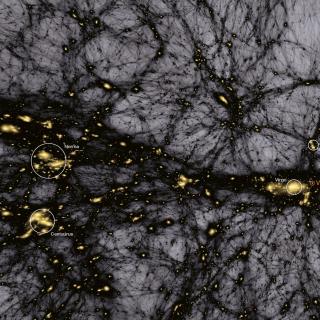Bibcode
Burenin, R. A.; Bikmaev, I. F.; Khamitov, I. M.; Zaznobin, I. A.; Khorunzhev, G. A.; Eselevich, M. V.; Afanasiev, V. L.; Dodonov, S. N.; Rubiño-Martín, J.-A.; Aghanim, N.; Sunyaev, R. A.
Bibliographical reference
Astronomy Letters, Volume 44, Issue 5, pp.297-308
Advertised on:
5
2018
Journal
Citations
28
Refereed citations
27
Description
We present the results of optical identifications and spectroscopic
redshift measurements for galaxy clusters from the second Planck
catalogue of Sunyaev-Zeldovich sources (PSZ2) located at high redshifts,
z ≈ 0.7-0.9. We used the data of optical observations with the
Russian-Turkish 1.5-mtelescope (RTT-150), the Sayan Observatory 1.6-m
telescope, the Calar Alto 3.5-m telescope, and the 6-m SAO RAS telescope
(BTA). The spectroscopic redshift measurements were obtained for seven
galaxy clusters, including one cluster, PSZ2 G126.57+51.61, from the
cosmological sample of the PSZ2 catalogue. In the central regions of two
clusters, PSZ2 G069.39+68.05 and PSZ2 G087.39-34.58, we detected arcs of
strong gravitational lensing of background galaxies, one of which is at
redshift z = 4.262. The data presented below roughly double the number
of known galaxy clusters in the second Planck catalogue of
Sunyaev-Zeldovich sources at high redshifts, z ≈ 0.8.
Related projects

Cosmology with Large Scale Structure Probes
The Cosmic Microwave Background (CMB) contains the statistical information about the early seeds of the structure formation in our Universe. Its natural counterpart in the local universe is the distribution of galaxies that arises as a result of gravitational growth of those primordial and small density fluctuations. The characterization of the
FRANCISCO SHU
KITAURA JOYANES